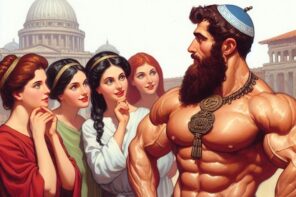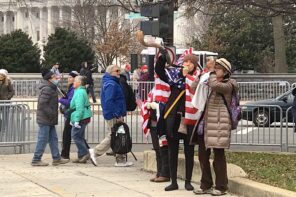Miko Peled’s memoir put me in the mood to do some autobiographical reflecting myself. Like Miko, I’ve been a vocal Jewish advocate of justice for Palestinians all my adult life, though we took rather different routes.
Miko learned it as a boy from his father, General Matti Peled, one of Israel’s most senior and honored military leaders, who spoke up loudly and constantly for peaceful reconciliation. The one thin thread connecting Miko’s path with mine is that I heard the general give a lecture at my university in the late 1970s, and his words spurred me to resume an activism I’d temporarily abandoned.
I didn’t need the general to tell me that the Israeli occupation of the West Bank and Gaza was wrong—I had known that from the day it began in June of 1967. What I didn’t know then, and am still not sure of, is why the vast majority of my fellow Jews cheered the victory of the occupying army and almost instantly made support for Israel’s policies the centerpiece of American Jewish life.
Growing up in the ’50s I had dutifully given my pennies at Hebrew School to plant trees in Israel, though beyond that I didn’t sense that the Jewish state was supposed to play any great role in my life. Years later I discovered sociological data confirming that, before the ’67 war, most adult Jews in the U.S. viewed Israel through a similarly distant lens.
What puzzled me, as a young student of religion, was why a whole religious community would suddenly choose to center its spiritual life on defense of a political state and antipathy toward that state’s perceived enemies. There is still no scholarly consensus about why it happened, though I’ve developed an explanation of my own (set out in the lead essay of a collection, Peace, Justice, and Jews).
For whatever reason, in those six days of 1967 the organized American Jewish community came under the spell of the myth of Israel’s insecurity—the conviction that, despite the obvious evidence of its overwhelming strength, Israel was a tiny “David” constantly menaced by neighboring “Goliaths,” which gave Israel the right to do anything as long as it was declared bishvil bitachon (“for the sake of security”).
What kind of religious or spiritual life, I asked myself and the few who would listen, is based on fear of enemies—especially when the antipathy of those “enemies” is understandable enough, and their resort to violence, though certainly tragic, is no different from what Israel and every other nation-state would do in their situation?
Wouldn’t it raise the level of Jewish moral and spiritual life a lot more to offer compromise and gestures of cooperation rather than guns and tanks? How can our community claim to offer ethical guidance to its children when we are cheering for, and funding, an occupying army?
What I learned from General Peled that night in the late ’70s was that compromise and cooperation would also make much more practical sense when it came to Israel’s security. As Miko sums up his father’s view:
Holding on to the West Bank was contrary to Israel’s strategy of building a secure Jewish democracy with a stable Jewish majority. If we kept these lands, popular resistance to the occupation was sure to arise, and Israel’s army would quell that resistance, with disastrous and demoralizing results. This would turn the Jewish state into an increasingly brutal occupying power.
People who arm themselves to the teeth and barricade themselves behind a wall broken only by military checkpoints can never feel secure. I hadn’t thought about it much from that angle before.
I also learned from General Peled that a small but very thoughtful Jewish peace movement in Israel was nurturing an inspiring vision. They understood that the Palestinians as a group were probably the best educated, most technologically skilled and economically savvy people in the Arab world. Imagine, these Jewish “peaceniks” said, Jewish and Palestinian states not merely tolerating each other but actively working together. They’d be the powerhouse of the Middle East, without question.
Hearing General Peled helped me to put together the pieces: Not only would a Jewish focus on compromise and cooperation enhance Jewish life in America, it would make the Jews of Israel much safer. I could believe in this vision, which most Jews dismissed as utopian, because I had recently returned from my sister’s wedding in Israel. I had seen her Jewish and Palestinian friends celebrate together joyously. I had visited the homes of my sister and brother-in-law’s Palestinian friends, where I had been welcomed graciously as an honored guest. These were just ordinary people. When Jews extended even a tentative hand of friendship, they responded with exuberant hugs. Why, I wondered, couldn’t that happen throughout the land?
I’ve gathered plenty of answers to that question over the intervening years, and Miko Peled’s book added more to my list. They all add up to the sobering conclusion that Miko learned from his father: The conflict continues largely because of the bellicose policies of the Israeli government and the abuses of the Israeli military.
One very important example: It’s an article of faith among most Jews (and most Americans) that Israel was compelled to fight for its life in 1967 against Egypt and other Arab nations determined to destroy it. But in fact Egypt massed troops on Israel’s border only because the Egyptians believed (from faulty intelligence) that Israel was preparing to invade its ally, Syria.
Though that wasn’t true, it is true that Israeli military leaders were urging their civilian government to fight a war sooner rather than later. The Israelis knew that the Egyptian army was far too weak to resist the Jewish forces. Indeed the Egyptians never would have massed their army on the border if they thought there would really be a war, since they knew their forces would be destroyed.
But the Israeli public got a very different story from the army, which told them “that the Arab armies were coming to rape and murder them, as the Nazis had done.” It worked. Civilian leaders in Israel are usually overpowered by such combined pressure from the military and public opinion.
Miko recalls Ehud Barak, now Israel’s Defense Minister, sitting in the Peleds’ home explaining that “in order to make peace he had to run [for Prime Minister] without making it look like he wanted peace so he wouldn’t lose votes for being a peacemaker.” When Miko asked “Why not tell the truth?”, he “received a lecture from one of [Barak’s] cronies about not understanding politics and being naïve.”
In 1967 the Israeli army also seized the West Bank, including East Jerusalem, without any permission from the civilian leaders. They called it “finishing the job.” Matti Peled recalled hearing his father say that as early as 1953 the military had determined to “push Israel’s eastern border to its natural location on the banks of the Jordan River.”
The occupying army cleared the way for civilian settlers who still use the mythic version of the 1967 events to claim an “inalienable right” to all that land. “Israel legitimately seized the disputed territories of Judea and Samaria in self-defense,” they argue, ignoring the historical evidence. “Israel’s moral claim to these territories, and the right of Israelis to call them home today, is therefore unassailable.”
General Peled and some other influential voices found such arguments as dangerous for Israel as they were morally wrongheaded. They met secretly with Palestinian leaders including Yasser Arafat. He “had serious people around him who saw the two-state solution as an option that was both pragmatic and practical.” Peled would brief the prime minister Yitzhak Rabin on these meetings. And he would tell lecture audiences, as I heard him say, that if Israel offered a two-state solution it would get a positive response from the Palestinians.
But Israel’s leaders insisted, as they still do, that the Palestinians would never settle for the West Bank and Gaza and would demand more land. When Peled presented “intelligence reports that showed clearly that an overwhelming majority of Palestinians” would accept a two-state settlement, “Rabin took him aside privately and told him it wasn’t the right political climate to discuss this.” No doubt Benjamin Netanyahu would say the same today.
Rabin eventually changed his tune, when he shook Arafat’s hand in 1993 to seal the Oslo Accords. Matti Peled watched the aftermath closely, as West Bank settlements grew and “good faith deadlines passed due to Israel inaction.” The General concluded that Rabin “had no intention” of ever letting the Palestinians have their own state. “Rabin [was] stalling and disregarding aspects of the agreement that would solidify Palestinian statehood, like ending the total Palestinian economic dependency on Israel.”
By 2000, when Bill Clinton brought Israel’s new prime minister, Barak, and Arafat to Camp David, the General had died. But his son had become more passionate than ever about peace because, a year earlier, his 13-year-old niece had been killed by a bomb in Jerusalem. The whole family had, in one way or another, committed itself to reaching out to Palestinans for the sake of reconciliation.
But at Camp David there was no reconciliation. Miko Peled explains why: “What the Israelis had demanded was tantamount to total Palestinian surrender.” Israel demanded a total end of hostilities but in return offered only “a Palestinian state on an area of land that could not be defined clearly because it was broken into pockets with no geographic continuity.” Though Arafat was prepared to yield much for peace, he could not go that far.
Although Peled’s autobiography offers these valuable lessons in history, his main message is the story of his own growing friendships with Palestinian activists struggling for independence. The latter chapters of his book, which detail these friendships, offer a rich three-dimensional picture of Palestinian life.
They’re full of vivid details that stick in the mind precisely because they are such ordinary day-to-day occurrences under military occupation: the mother who cannot go out to get water for her six-year-old daughter to drink, and is told by a soldier to let the kid drink dirty dishwater; the resistance leader who is released after years in Israeli prisons, then picked up the very same day and “detained” without charges for another full year; the little girl walking hand in hand with her sister, when her sister suddenly flies away, killed by an Israeli bullet in the head. The girl’s father has become “known for his dedication to reconciliation,” Miko adds, just like Miko’s brother, whose own daughter was killed, and hundreds of other Israelis and Palestinians in the Bereaved Families Forum.
When Miko was arrested at a demonstration in a Palestinian village, the local Israeli commander told the soldiers: “He is an Israeli citizen and he has rights. He’s not a Palestinian that I can just beat up and throw in prison.” Under these conditions, Miko finds it extraordinary that Palestinians generally remain so calm and emotionally restrained—even when they’re in prison. His memoir gives convincing evidence to support his conclusion that “the bulk of Palestinian resistance has always been nonviolent.” (For much more evidence, see the wonderful collection of essays by Jewish and Palestinian nonviolent activists, Refusing to Be Enemies.)
Miko Peled closes with an account of a fierce argument with his brother: Miko supporting a one-state solution, while his brother (like myself) seeing a two-state solution as the only viable outcome. It’s a disagreement about which path to take to the same mountaintop we all hope to reach: peace, security, and justice for Israelis and Palestinians both.
Miko started on that path as a boy, tutored by his father, though he’d hardly ever spoken to a Palestinian; I started as a young man though I not only hadn’t met a Palestinian, I knew nothing about their lives under occupation. Every day, more and more American Jews start heading toward that mountaintop—most of them, in my experience, stirred first by some direct awareness of the sufferings of Palestinians. Reading The General’s Son will surely give others that awareness.
Whatever the initial motive, the most important result is the realization that, as Miko Peled says, fear has tragically become “almost inseparable” from Jewish culture. In order for Palestinians and Jews alike to live full, humane lives, fear has to be “overcome and replaced by trust.”




